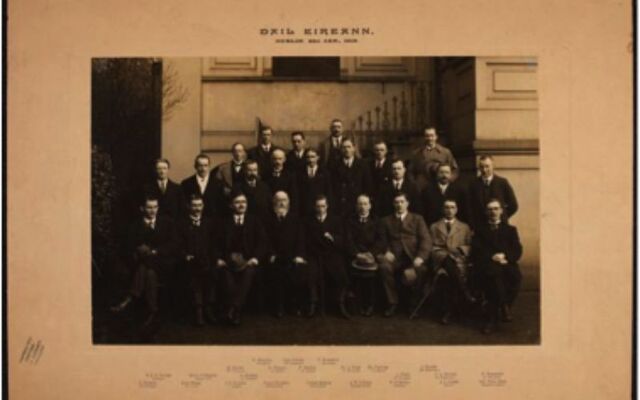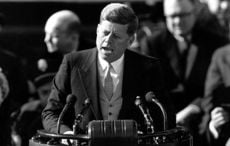When the first Dáil convened on January 21, 1919, independence from Great Britain was declared.
Fast-moving and far-reaching events at the end of 1918 shaped Europe, including Ireland, for many decades. Within a two-month period, World War I ended, Great Britain held a general election and the first Irish Dáil (Irish parliament) met in Dublin.
When the first Dáil convened on January 21, 1919, independence from Great Britain was declared. On the same day, Irish Volunteers in Co. Tipperary ambushed and killed two members of the Royal Irish Constabulary (RIC) who were transporting gelignite (explosives) to a quarry. The attack was the start of the Irish War of Independence.
World War I, known as “the war to end all wars,” lasted four years, and decimated an entire generation of young men. Losses for the Allies (Great Britain, France, Italy, Russia and the U.S.) numbered four million killed; losses for the Central Powers (Germany, Austria-Hungary and the Ottoman Empire) numbered 3.2 million killed. Millions of civilians also died.
The war’s end came as a surprise. After German soldiers began to revolt, the Kaiser abdicated his throne. The Allies defeated the Central Powers by outlasting them. An armistice was signed and “the guns fell silent” at the eleventh hour, of the eleventh day, on the eleventh month of 1918.
British Prime Minister David Lloyd George became known as “the man who won the war.” Winston Churchill described him as “the pilot who had weathered the storm.” The Prime Minister promptly called for a general election.
Many factors motivated his decision. “The Parliament, elected for five, had lasted eight years,” and the electorate had increased two and one-half fold since the last election due to the passage of the Representation of the People Act. Also, there was a sentiment that soldiers returning home from the front deserved a say in how the country would be run after the war.
Read more
But the Prime Minister’s overriding consideration in calling for an immediate election was to capitalize on his popularity. He “asked the electorate to give the coalition that had won the war a chance to sort out the peace,” which is what British voters did. The outcome in Great Britain was “a huge triumph for the coalition.”
The Irish Parliamentary Party (IPP) had been Ireland’s leading political party for many decades. The IPP sent its representatives, elected members of Parliament (MP’s), to London. The main tenet of its platform was “Home Rule for Ireland;” that is, an Irish assembly with a limited franchise and authority subject to the British Parliament. During the war, the IPP - led by John Redmond - supported the British war effort.
When a conscription bill that would have imposed a draft in Ireland was introduced before the British Parliament, Sinn Féin fiercely and successfully opposed it. In the general election, Irish voters rewarded Sinn Féin for keeping their loved ones out of the war. Voters did so at the expense of the IPP.
Sinn Féin eviscerated the IPP in the election, winning 73 seats. The IPP fell from 80 MPs to 6. The results were a forceful showing that Home Rule was no longer enough. Ireland wanted full independence.
During the campaign, Sinn Féin said it would adhere to a policy of abstentionism if elected, by refusing to sit in the British Parliament. They fulfilled this promise and another one when the Dáil Eireann, a completely autonomous and self-governing Irish Parliament, was established. Mary MacSwiney wrote to her brother - the immortal hunger striker and Cork Mayor Terence MacSwiney - who was in prison, telling him “it isn’t the men but the policy that is winning.”
Elected Sinn Féiners were “active” Volunteers. Many had fought in the Easter Rising, and a majority of them were still jailed or interned. When the Dáil convened in public session at the Mansion House, only 28 Sinn Féiners were in attendance. Michael Collins and Harry Boland were not present because they were in Great Britain arranging to break Eamon de Valera out of Lincoln Prison.
Nor did Constance Markievicz attend. She was in jail. The 28 who made the meeting were deemed to constitute a quorum. Cathal Brugha, who had been seriously wounded during the Easter Rising, presided over the proceedings.
The Dáil issued a declaration of independence affirming the 1916 proclamation of an Irish Republic that was read by Patrick Pearse on the steps of the GPO on the first day of the Rising.
The Dail’s declaration said: “We the elected representatives of the ancient Irish people in the National Parliament assembled . . . ratify the establishment of the Irish Republic and pledge ourselves and our people to make this Declaration effective by every means at our command. We ordain . . . that the Irish Parliament is the only Parliament to which people will give its allegiance. We solemnly declare foreign government in Ireland to be an invasion of our national right which we will never tolerate, and we demand evacuation of our country by the English garrison.”
Read more
On the same day, Irish Volunteers in South Tipperary, led by Sean Treacy and Dan Breen, held up members of the RIC, who were transporting gelignite to a quarry in Soloheadbeg, Co. Tipperary. The ambush was planned and executed as a local undertaking.
It was driven by a number of factors. Volunteers were in need of explosives. The action was seen as a way to boost Volunteer morale and set an example for other Volunteer units. It would also send a strong message of defiance to British authorities.
After receiving a tip, the Volunteers staked-out a road and waited. When the horse-drawn cart arrived, they called on the two armed policemen to surrender. The police refused and were shot and killed. Their deaths made the undertaking highly controversial. Additionally, the attack had not been authorized by the Dáil.
The ambush had momentous implications. First, Volunteers were able to use the 160 pounds of explosives seized in the raid in future operations.
Second, it led to the Volunteers being called the Irish Republican Army.
Third, it “pioneered” the use of hit-and-run guerilla warfare tactics by forces outgunned and outnumbered by a more formidable army.
Finally, it started a war that would ultimately lead to what the Tipperary Volunteers had hoped their action could achieve – turning the Easter Rising’s aspirational republic into a reality.
By overwhelmingly electing Sinn Féin, the people had spoken in favor of an Irish Parliament and provided a clear mandate for independence. Thus, the establishment of the Dáil Éireann and the Dáil’s declaration of independence had a strong foundation.

The burning of Cork during the Irish War of Independence.
What was not clear at the time of the election, however, was whether independence would be pursued by democratic means or armed force.
Despite this uncertainty, the results provided “legitimacy” to waging a War of Independence.
That legitimacy was bolstered by what the first Dáil chose to ratify, ordain, declare, and demand on January 21, 1919.
* This article was originally published in 2021 and updated in January 2026.
This article was submitted to the IrishCentral contributors network by a member of the global Irish community. To become an IrishCentral contributor click here.




Comments